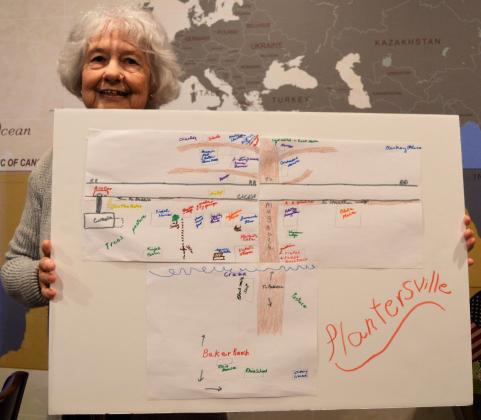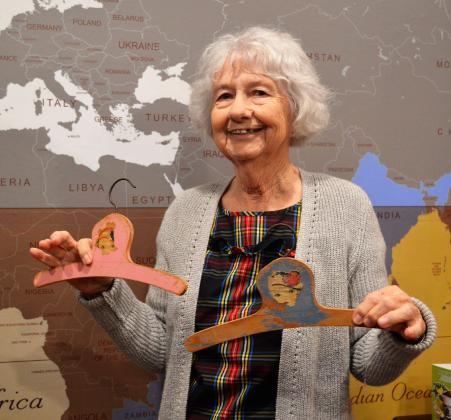Mock recalls life in early Plantersville
The Daughters of the Republic of Texas received a remarkable glimpse into Plantersville history when resident Mary Grace Mock shared her recollections at the DRT quarterly meeting April 13. At 80-years-plus, Mock is unique in that she has done what many seniors neglect to do and that is to document the history of their family and community for future generations.
Armed with a spiral notebook of memories both good and sad, a few photos and a map of the Plantersville of her childhood, Mock talked about growing up with touching humor.
“Get 105 out of your mind”
Mock began by explaining her hand-drawn map of pre-1941 Plantersville with its stores, café, churches, gristmill, cotton gin and family farms. She reminded her audience that back then all roads were dirt, and said, “Get 105 out of your mind. It was not there then.”
According to Mock, in the very early days of Plantersville, buying groceries meant traveling to Houston in wagons and buying in bulk.
She said, “Big 100-pound sacks of flour, 100-pound sacks of cornmeal and it had to last you. When things started changing and the stores started being built, it was a little better, but we still had bad roads!”
Mock described the Plantersville of her childhood as a “different place.”
She said, “It had a booming economy. Cotton was king, and corn and whatever else they grew was major.”
Plantersville had five grocery stores, three gas stations, one bank, a gristmill, a cotton gin, a blacksmith shop and a barber shop. The bank, Security State Bank, later closed and moved to Navasota. The barber shop building still exists but was relocated next to the former Masonic Lodge, now called Town Hall.
Plantersville also had a fair share of gasoline pumps.
Mock said, “There was a story that went around that Bonnie and Clyde got gasoline at one of those places in Planters-ville. That’s one of our claims to fame.”
Family history
Early in Grimes County history, a major portion of land in that area was owned by the Isaac Baker family. Mock joked that as a child, she thought the Bakers owned everything outside of Navasota.
Mock’s father’s family came from the Alsace-Lorraine region of western Europe, an area constantly fought over by France and Germany. They escaped that strife via the Ukraine before immigrating to the United States.
After the Civil War, the Bakers needed help farming their land and with assistance from the Archdiocese of Galveston and Father Joseph Klein of St. Mary’s Catholic Church, Mock’s ancestors came to the “New World.”
She said, “They came over as sharecroppers and they lived on the ranch and worked the ranch in that capacity.”
Eventually they bought property and cattle of their own, and “their lives progressed very well.”
Mock said, “The only way that people arrived in Plantersville in the 1920s was on the railroad … a place called Crook’s Switch.”
Her mother, a school teacher from Goliad, came to Plantersville to teach at the Klein School established by Father Klein’s brother, Martin. It was there her parents met, and they married in 1925.
Life changing 1941
Mock said, “1941 stands out in my memory because major things happened to my life then. My dad became very ill. He had a store in Plantersville and Stoneham and his dream was to be like Weingarten’s. Bless his heart, he probably would have done it had he lived.”
According to Mock, her father sought treatment from Dr. S. D. Coleman in Navasota and Coleman sent him to Scott and White in Temple, “the only big cancer research place.” He was diagnosed with colon cancer and died shortly thereafter.
For Mock, who was about 5-years-old, 1941 was not through with life-changing events. She started first-grade that year in the newly accredited Plantersville Independent School District and construction of Highway 105 began. The Japanese attacked Pearl Harbor and America entered World War II. Her brother entered the Navy and it was a very difficult goodbye for the youngster.
According to Mock, Plantersville school children supported the war effort by collecting cans.
She said, “We didn’t have a pickup. We had a wagon pulled by either a tractor or mules. I had a little cape that was navy blue with red lining. My mother got me a little white dress and a nurse cap. I was the nurse in the wagon.”
With children representing the Army, Navy and Air Force, she said, “We went all around Plantersville in that wagon, standing up and I don’t recall falling. We went to every place we could gathering cans … and we were real happy to do that.”
A happy childhood
In 1944, Plantersville ISD closed, and Mock went to school in the “big city” of Navasota.
Mock says she was raised in a loving home and has many good memories such as her father reading her the “funny papers” after Sunday church, dressing up in her mother’s clothes and playing paper dolls.
And there were tent shows, mud pies, catching bugs and making roads in the dirt for toy cars. Mock watched the cotton wagons roll by and sang to her heart’s content in her tree swing.
This “princess” on the Navasota Watermelon Festival float also swam in the creek and at their favorite teen spot – the Rock Hole swimming hole.
Mock said, “I wondered why mother didn’t worry about me. You didn’t have to worry about any kids in Plantersville. When we were in junior high or high school, we walked all over town and nobody worried about us. Not so now.”
She said, “Plantersville was a working place, economically well-off - not that anybody was terribly rich - but it was a good place to live. It really was.”


